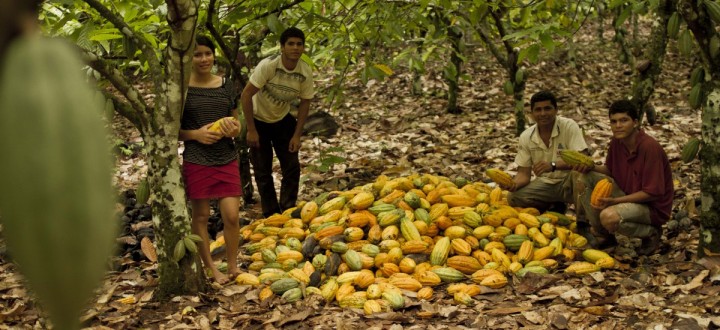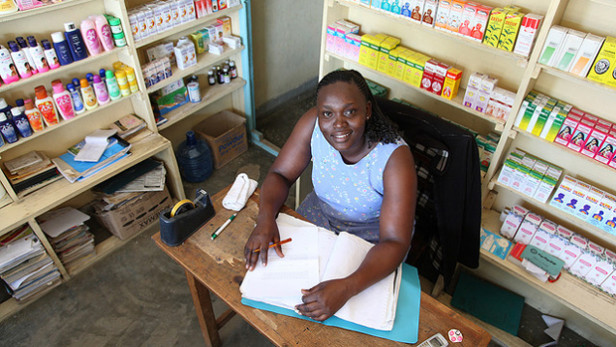WASHINGTON, DC | September 22, 2014 - This week on BIZ+SOCIAL, we bring you the best from the New Global Citizen, Devex Impact, SSIR, and more.
GLOBAL PRO BONO
IBM and the Nature Conservancy Partner to Track Deforestation in the Amazon
 In May of 2014, I had the opportunity to visit the city of Belém in the Brazilian Amazon to learn from the public and NGO sectors how the Brazil government is currently addressing deforestation in rural private lands in the Amazon. As a Brazilian, deforestation in this region has loomed over the political and public discourse of my home country for as long as I can remember. Fueled by a multitude of social and market forces, Brazil alone has cleared more than 153,000 square miles of Amazon rainforest since the early 1990’s. However, after an especially destructive year in 2004 and due in part to new political leadership, deforestation rates in Brazil actually began to fall. For the first time in my life, I felt hopeful that the Brazilian government was working to monitor and curtail this dire problem. Unfortunately, my optimism was short-lived. In 2013, deforestation increased by 33 percent, reversing part of the progress that had been made over the previous decade. Economic expansion in emerging and developed markets alike has motivated agribusinesses to clear huge areas of the Amazon to meet a growing global demand for commodities like soybeans, beef, and timber. According to The Nature Conservancy, every 15 minutes, an area of Brazil’s Amazon rainforest larger than 200 football fields is destroyed. Close to 20 percent of the Amazon has been cut down in the past 40 years, and scientists predict another 20 percent of the trees will be lost in the next 20 years. Read More…
In May of 2014, I had the opportunity to visit the city of Belém in the Brazilian Amazon to learn from the public and NGO sectors how the Brazil government is currently addressing deforestation in rural private lands in the Amazon. As a Brazilian, deforestation in this region has loomed over the political and public discourse of my home country for as long as I can remember. Fueled by a multitude of social and market forces, Brazil alone has cleared more than 153,000 square miles of Amazon rainforest since the early 1990’s. However, after an especially destructive year in 2004 and due in part to new political leadership, deforestation rates in Brazil actually began to fall. For the first time in my life, I felt hopeful that the Brazilian government was working to monitor and curtail this dire problem. Unfortunately, my optimism was short-lived. In 2013, deforestation increased by 33 percent, reversing part of the progress that had been made over the previous decade. Economic expansion in emerging and developed markets alike has motivated agribusinesses to clear huge areas of the Amazon to meet a growing global demand for commodities like soybeans, beef, and timber. According to The Nature Conservancy, every 15 minutes, an area of Brazil’s Amazon rainforest larger than 200 football fields is destroyed. Close to 20 percent of the Amazon has been cut down in the past 40 years, and scientists predict another 20 percent of the trees will be lost in the next 20 years. Read More…
IMPACT & INNOVATION
Can Crowdfunding Help Finance the ‘Missing Middle?’
 What does a social business do when they don’t have a rich uncle to help them go from microenterprise to a small- or medium-sized enterprises? The answer may be crowdfunding. Much has been made of the “missing middle” — the lack of SMEs in most developing countries — and one key, often bemoaned obstacle is a lack of financing. While still in the early stages, some organizations have turned to crowdfunding for low-cost, risk-tolerant capital to help the entrepreneurs they serve bridge the gap between microfinance and commercial lending. Kiva, a crowdfunding nonprofit that aims to alleviate poverty through lending, already recognized a few years ago the need to fund these social enterprises and recently decided to expand its portfolio. It was a shift for the organization, which up to this point had focused on crowdfunding microfinance loans, but one that has so far proven mostly successful, and according to funding partners, has helped leverage additional funds for social enterprises. “In my personal opinion this is a space that is potentially larger than microfinance,” Carlos Pierre, Kiva’s manager of strategic initiatives, told Devex. “There is a massive need for financing for small companies.” Many social enterprises struggle to find working capital and growth funding, as commercial banks and traditional funding sources are often unwilling to take on the risk of lending to them. In some cases, that leaves a business with an order for 200,000 items it cannot produce because it lacks the money to purchase the supplies and pay for the shipping. It’s a story of continual missed opportunities for growth — of both jobs and economies. Read more…
What does a social business do when they don’t have a rich uncle to help them go from microenterprise to a small- or medium-sized enterprises? The answer may be crowdfunding. Much has been made of the “missing middle” — the lack of SMEs in most developing countries — and one key, often bemoaned obstacle is a lack of financing. While still in the early stages, some organizations have turned to crowdfunding for low-cost, risk-tolerant capital to help the entrepreneurs they serve bridge the gap between microfinance and commercial lending. Kiva, a crowdfunding nonprofit that aims to alleviate poverty through lending, already recognized a few years ago the need to fund these social enterprises and recently decided to expand its portfolio. It was a shift for the organization, which up to this point had focused on crowdfunding microfinance loans, but one that has so far proven mostly successful, and according to funding partners, has helped leverage additional funds for social enterprises. “In my personal opinion this is a space that is potentially larger than microfinance,” Carlos Pierre, Kiva’s manager of strategic initiatives, told Devex. “There is a massive need for financing for small companies.” Many social enterprises struggle to find working capital and growth funding, as commercial banks and traditional funding sources are often unwilling to take on the risk of lending to them. In some cases, that leaves a business with an order for 200,000 items it cannot produce because it lacks the money to purchase the supplies and pay for the shipping. It’s a story of continual missed opportunities for growth — of both jobs and economies. Read more…
LEADERSHIP
Get Your Team to Stop Second-Guessing Decisions
Not long ago, the division head of a multinational manufacturing company had a problem. After receiving an aggressive 12% annual growth target, she met with her team, and after a lot of research, meetings, and debates, they built a strategic plan around 17 key initiatives ranging from the overhaul of a production facility in Nebraska to fully integrating a new distributor in Nigeria. Everyone on the team was on board with the plan, and they were optimistic about its outcome. But just a weeks before the start of the fiscal year, they began to doubt their abilities to execute so many initiatives at once and they started second-guessing their overall direction. What happened? Was it a case of performance anxiety? Was the plan truly flawed? Was the team just being lazy or disloyal? None of the above. The team lost commitment because they suffered from a very common problem called planner’s remorse. Just like the buyer’s remorse people feel after buying a car or a house, planner’s remorse is the natural sense of regret we sometimes feel after buying into a plan. It is the same psychological phenomenon that gives fiancés cold feet and causes negotiators to back out of deals during the cooling-off period. Immediately after deciding to pursue a course of action, we often experience a kind of euphoria because switching gears from contemplation to action activates a different part of our brains. But the bliss is fleeting. After a few days, our brains very predictably return to normal and euphoria gives way to remorse. Read More…
ENTERPRISE DEVELOPMENT
A Working Model for Slum Rehabilitation
 Mumbai is commonly referred to as India’s New York City—the country’s commercial, financial, and entertainment capital. The city accommodates more than 20 million residents; it boasts a diverse and perennially growing population, attracting people from bankers to migrant workers. The city that today comprises 2 percent of the nation’s population, contributes more than 25 percent of its industrial output, and pays 33 percent of its taxes. A land-starved island city with an expensive property market (unlike the rest of the country), Mumbai is among the densest cities on earth—five times denser than London and three times denser than New York City. Amid this density is the underbelly of Mumbai’s rapid growth: its immense slums. Mumbai has the dubious distinction of being both the economic and the slum capital of India, housing the sixth highest number of billionaires and paradoxically, a tenth of India’s slums. Urban migration, compounded by lack of affordable housing, has resulted in more and more people squatting on mostly government land over decades. Slums pockmark the entire metropolis, housing more than 9 million residents and covering half its land mass. After numerous unsuccessful attempts to address this problem—demolition, forced re-settlements, and other measures—successive local governments commenced various slum improvement works, subsequently legitimizing many of these dwellings. These local governments issued soft leases of land to certain slums via a World-Bank-funded, urban development project that also included providing some civic amenities and loans to fund home improvements to slums. . Read more…
Mumbai is commonly referred to as India’s New York City—the country’s commercial, financial, and entertainment capital. The city accommodates more than 20 million residents; it boasts a diverse and perennially growing population, attracting people from bankers to migrant workers. The city that today comprises 2 percent of the nation’s population, contributes more than 25 percent of its industrial output, and pays 33 percent of its taxes. A land-starved island city with an expensive property market (unlike the rest of the country), Mumbai is among the densest cities on earth—five times denser than London and three times denser than New York City. Amid this density is the underbelly of Mumbai’s rapid growth: its immense slums. Mumbai has the dubious distinction of being both the economic and the slum capital of India, housing the sixth highest number of billionaires and paradoxically, a tenth of India’s slums. Urban migration, compounded by lack of affordable housing, has resulted in more and more people squatting on mostly government land over decades. Slums pockmark the entire metropolis, housing more than 9 million residents and covering half its land mass. After numerous unsuccessful attempts to address this problem—demolition, forced re-settlements, and other measures—successive local governments commenced various slum improvement works, subsequently legitimizing many of these dwellings. These local governments issued soft leases of land to certain slums via a World-Bank-funded, urban development project that also included providing some civic amenities and loans to fund home improvements to slums. . Read more…
CITIZEN DIPLOMACY
In the Field of Women’s Sports, Global Goes Local and Local Goes Global
What does the U.S. Department of State, the government agency devoted to international affairs, have to do with sports? Why would a U.S. federal department working with foreign governments try to get in on the sports game? Because sports connect people from around the world—women, men, girls, boys, young, and old—on a grassroots and face-to-face level. In the international arena, sports are a universal force that can motivate, captivate, and unite us regardless of our backgrounds. It is in this light that the State Department’s Sports Diplomacy Division taps into the power of people-to-people sports exchange programs to build bridges between nations. No translation necessary. When you sweat it out together, you can understand one another better. On this common ground, we can work together to address both local and global challenges. Among these challenges, gender inequality emerges as one of urgency and utmost significance. While the uphill battles facing women and girls vary in degree between countries, communities, and even families, the gaps are prevalent. Building on a long-term commitment to gender-balanced exchange programming, the State Department officially launched the Empowering Women and Girls through Sports Initiative in 2012. Through this initiative, the State Department shares a distinct mission with the Women’s Sports Foundation (WSF): the goal to empower women and girls through sports here and abroad. Read More…
MORE
USAID Taps Social Start-Ups to Tackle World Poverty
Conflict Kitchen Puts Peace on the Table
Effective Financial Management is Key to Success for New Sri Lankan Businesses
New Global Citizen
The New Global Citizen chronicles the stories, strategies, and impact of innovative leadership and international engagement around the world. This is the world of the new global citizen. This is your world.





